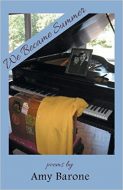 Amy Barone
Amy Barone
We Became Summer
New York Quarterly Books
Reviewer: Francine Witte
Let’s face it. When the title of a poetry collection is a perfect three-word poem itself, you know you’re in for a pretty good ride. Such is the case with Amy Barone’s first full-length collection We Became Summer. The title suggests so much, asks so much, has so much evocative white space around it, that it functions the way any good poem does, just enough to tantalize the reader and trigger an explosion of questions.
This is a poetic memoir told in five sections – “Heat,” “Light,” “Sounds,” “Home,” and “Breeze.” Each section works as a chapter, and though each poem stands alone, this organization strengthens each poem with context.
“Heat” deals with the narrator’s childhood and adolescence, the notion of safety and innocence that we associate with youth. Barone sets the table with “Seasonal Nectar”:
Plums, with their sweet juicy flesh, stoked desire.
More accessible than forbidden figs whose naked trees
bordered our backyard.
Watermelon signaled a party with cousins or neighbors,
fun and games. Contests where we shot the black seeds
from our mouths, salvaged remains to plant later.
We needed little else.
Warmed ourselves chilly nights dreaming
of ruby fruit that streaked summer days.
This poem captures the essence of these youthful summers – the wonder of fruit and desire, family gatherings, and indeed how “We needed little else.”
Of course, the narrator would need more, and as the section goes on, we see the need that youthful desire brings: first kisses, boyfriends. But somehow, there is an awareness that this isn’t playing out as it does in the old movies. In “Summer Haze,” we are taken again to family parties, but this time we get a hint of the adolescent shift most girls face, during which their families and lives are too real. It’s a well-placed note of conflict that will play out throughout the remaining sections.
Next, in “Light,” we are taken to the narrator’s early adulthood, spent in Italy where, among other freedoms, she rides “on the back of a Harley…fearless and helmet-less” (“Retro Rider”). She falls into the same creative mindset as Hemingway. But alas, this sense of safety is interrupted as before, this time by the invasion of English tourists who are buying up houses in her beloved Italy. In “Contemplating Abruzzo,” she asks:
Will the hoards appreciate Abruzzo’s hidden beauty?
The Orfento Valley cloaked in a massive shadow or spotted
bright green when the sun plays hide and seek?
Medieval churches adorned with little gold and ancient
abbeys situated off the beaten track? Will they savor lamb stew,
pasta shaped like guitar strings and pork roasted to perfection?
These pictures of Italy, as with her pictures of adolescence, are rendered beautifully though well-crafted imagery. Each poem is a vignette, enhanced by its placement in the section.
Next, we move on to “Sounds,” a section heavily populated by the narrator’s love of music. We get the connection in “Clifford Plays Somethin’”:
I want to live my life like
Clifford plays the drums.
Coolly observing the heady scene…
The section continues with recounts of music lessons, various concerts, encounters with troubled musicians/boyfriends, swinging jazz, Bahia beats, and bop juice.
Next the narrator takes us “Home,” where she begins to recollect her parents, now gone. We hear the soundtracks to her parents’ lives. We meet the narrator’s grandmother, Amelia, for whom she is named and the person she wants to be “nothing and everything like.”
Through these family recollections, Barone reflects on the past, as she did in the first section, but this section has a different tone and feel. This is not the whimsical review of childhood/teen years from a young adult’s perspective as is “Heat,” but a more seasoned, comprehensive look back at a bigger canvas.
A particularly touching poem is “Echoes of a Hardware Store,” in which our narrator recalls her father and his place of business.
His strong hands endured life’s stages.
They’re all I recognized on the day of final goodbyes.
With fingertips slightly callused, he didn’t have the hands
of a doctor or a lawyer or a corporate dad.
They were the hands of a hardware store merchant.
Such a bygone expression, but one I glimpsed on countless
old documents, as I took inventory of his material world.
He mastered the nuts and bolts of life: make lists,
pray before bed, be loyal to family, spend less than you earn…
We played with reverence in his workplace, listened for his fast gait,
which a monstrous illness eventually lassoed.
This is certainly a poem that speaks to the understanding we gain of our parents and the real lives they led. It feels very authentic to consider your parents as the people they were aside from simply being your parents. It speaks to that moment when you realize they were people you might like to know, with whom you could just shoot the breeze now that you yourself are an adult. This poem captures that feeling beautifully.
The sentiment that comes through loud and clear in this section is expressed in the last line of “Fall in Philadelphia,” with its poignant realization that “We want all that we had.”
The final section, “Breeze,” does exactly what that suggests, moves us along. Like the narrator, we take what we have lived, experience it, synthesize it, and we become summer.
Amy Barone’s collection is a beautifully told story of a life, each poem an experience in itself; like any compelling jewel, though, enhanced by its placement in a good setting.
Grab a nice, cool summer drink, put on your shades, and settle into your lawn chair. Read We Became Summer – poems which tell a story probably much like your own.

